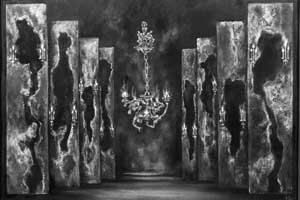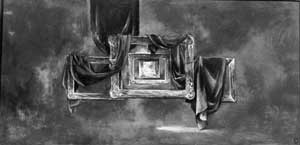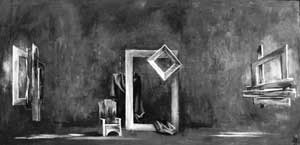|
|
Прожить в театре какую-то часть жизни я считал полезным, в чем-то незаменимым для художника опытом. Отрезок этот получился длиннее предполагаемого — вместо трех-четырех лет более десяти, когда весь распорядок жизни так или иначе был замкнут на театре, окрашен и придуман им же. Театр
— это чарующая пучина, в коридорах и бархатно-затемненных ложах которого можно заблудиться навсегда, а от сценической магии ослепнуть настолько, что свет софитов подменит свет Нетварный. В театр меня пригласил и ввел легендарный тогда актер и если не самый модный, то самый мощный режиссер, умевший сочетать крупные мазки постановщика с филигранной актерской техникой,— Борис Бабочкин. Вулканически непредсказуемым он был и в творчестве и в самоубийственной неуживчивости, искупающим оправданием которой был только его почти подневольный дар творческой самоотдачи. Многие считали его деспотом с капризами желчного гения, которому позволялось в театре все. Мы сделали с ним один спектакль — «Трехгрошовую оперу» по Брехту и уже готовились к выходу на монтировочные репетиции второй постановки — «Тихого Дона» на сцене Малого театра. По полифоничности режиссерского замысла этот спектакль призван был стать значительным событием в первую очередь из-за своего неожиданного акцента не на лирико-драматических, а на беспощадно-обнаженных, даже натуралистических узловых событиях романа. Чуда, однако, не случилось, и, несмотря на личные усилия Шолохова, находившегося в зените мировой славы, только что получившего тогда Нобелевскую премию, «пробить» инсценировку через идеологический отдел ЦК не удалось. Работа над ней с вердиктом всесильного Суслова — «кровавая и антисоветская» — была остановлена навсегда.
Память о работе с Б. Бабочкиным задержала меня в театре тщетным ожиданием близкого по мировоззрению режиссера, сходного с Борисом Андреевичем глубиной и серьезностью погружения в драматургический материал, и мой отход от театра начался серией пейзажей-видений, в которых театр пробивался сюрреалистической метафорой пространства, которое долго-долго напоминало сценическое... Некоторые из работ той серии, помещенные здесь, являются продолжением театра, его стилизованного романтизма. |
|
I believed that it was useful to live for some time in the theatre, that it was an experience indispensible for the artist. But this time turned out to be longer than I supposed, instead of some three to four years it came out over ten. And all my life order was somehow closed by the theatre; it was coloured and thought up by it. Theatre is a charming abyss; in its halls and dark boxes you can get lost forever, and the magic of the stage can blind you so much that the Heavenly light will be replaced by the light of the soffits. I was invited to the theatre by the then legendary actor Boris Babochkin, who also was, if not the most fashionable, then the most powerful director, combining rough strokes of a director with meticulous acting skill. He was volcanically unpredictable in his art and in his suicidally unaccomodating nature as well. Only his almost forced gift of self-sacrificing work could excuse it. Many people considered him a despot, with the caprices of a spoilt genius, who could do anything he liked in the theatre. Together with him I made one performance, ‘The Threepenny Opera’ by Brecht. We were ready for the rehearsals of one more play on the Maly Theatre’s stage, ‘Quiet Flows the Don’, which was supposed to become a significant event in the theatre, first of all by its unusual accent not on the lyrical and dramatic, but on the mercilessly revealed main events of the novel, sometimes even to naturalistic extent. However, the miracle never came true; despite personal efforts of Sholokhov who was at the zenith of world fame and just received the Nobel prize, we failed to get permission for the staging from the ideological department of the Central Committee, and with the verdict of almighty Suslov, ‘bloody and anti-Soviet’, the work on it was stopped forever.
Remembering my work with B. Babochkin, I stayed in the theatre for some more time, as I was waiting in vain for another director to come, whose outlook, by its depth and seriousness of the submergence into dramaturgic material, would be near to that of Boris Babochkin. My moving away from the theatre began with a series of vision-like landscapes where theatre was revealing itself in a surrealistic metaphorical space, which for a long time resembled that of the stage... Some of the works of this series placed here are the continuation of theatre, of its stylized romanticism. |
|


 |
|